PRINCIPAL INVESTIGATOR
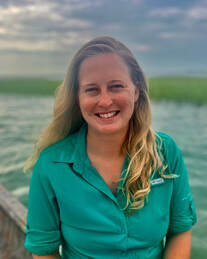
Dr. Rachel K. Gittman
Dr. Gittman is an Assistant Professor in the Department of Biology and Coastal Studies Institute at East Carolina University. Her research focal areas include marine community ecology, restoration ecology, coastal management and policy, and sustainability science. She received her doctorate in Ecology from the University of North Carolina at Chapel Hill in 2014 and was a Postdoctoral Research Associate at Northeastern University from 2015-2017. Before attending graduate school, Dr. Gittman was an environmental consultant in Washington D.C. for three years after graduating from the University of Virginia in 2006 with a B.S. in Environmental Sciences with High Distinction
Dr. Gittman is an Assistant Professor in the Department of Biology and Coastal Studies Institute at East Carolina University. Her research focal areas include marine community ecology, restoration ecology, coastal management and policy, and sustainability science. She received her doctorate in Ecology from the University of North Carolina at Chapel Hill in 2014 and was a Postdoctoral Research Associate at Northeastern University from 2015-2017. Before attending graduate school, Dr. Gittman was an environmental consultant in Washington D.C. for three years after graduating from the University of Virginia in 2006 with a B.S. in Environmental Sciences with High Distinction
Graduate Students
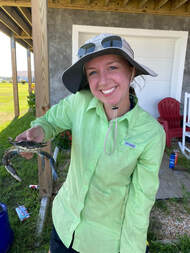
Megan Geesin
Megan is a PhD candidate in the Integrated Coastal Sciences Program at East Carolina University. Her dissertation research focuses on investigating the influence of different living shoreline structures on their surrounding habitats and vice versa through the use of in situ methods and remote sensing techniques. Megan graduated from the University of Maryland College Park in 2020 with a B.S. in Biology specializing in Ecology and Evolution, and minors in Paleobiology and Spanish. Before starting at ECU, Megan worked in labs at the University of Maryland, the Coastal Studies Institute, and Horn Point laboratory at the University of Maryland Center for Environmental Science.
Megan is a PhD candidate in the Integrated Coastal Sciences Program at East Carolina University. Her dissertation research focuses on investigating the influence of different living shoreline structures on their surrounding habitats and vice versa through the use of in situ methods and remote sensing techniques. Megan graduated from the University of Maryland College Park in 2020 with a B.S. in Biology specializing in Ecology and Evolution, and minors in Paleobiology and Spanish. Before starting at ECU, Megan worked in labs at the University of Maryland, the Coastal Studies Institute, and Horn Point laboratory at the University of Maryland Center for Environmental Science.
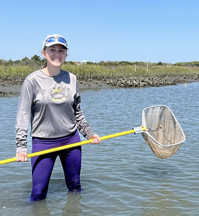
Grace Loonam
Grace is a Master’s student in the Biology Program at East Carolina University advised by Dr. April Blakeslee and co-advised by Dr. Gittman. For her thesis, she is using biodiversity and habitat complexity as indicators of community assembly following oyster reef restoration. Grace graduated from George Mason University in 2022 with a B.S. in Environmental Science, with a concentration in Ecological Science and a minor in Conservation Studies. Prior to ECU, she completed internships at the Shoals Marine Laboratory in Appledore Island, ME, and at the Smithsonian Environmental Research Center in Edgewater, Maryland.
Grace is a Master’s student in the Biology Program at East Carolina University advised by Dr. April Blakeslee and co-advised by Dr. Gittman. For her thesis, she is using biodiversity and habitat complexity as indicators of community assembly following oyster reef restoration. Grace graduated from George Mason University in 2022 with a B.S. in Environmental Science, with a concentration in Ecological Science and a minor in Conservation Studies. Prior to ECU, she completed internships at the Shoals Marine Laboratory in Appledore Island, ME, and at the Smithsonian Environmental Research Center in Edgewater, Maryland.
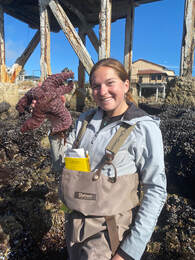
Paige Siegel
Paige Siegel is a M.S. student in the Department of Biology at East Carolina University. Her research interests lie in combining traditional field ecology with quantitative techniques to understand how species interactions influence coastal resilience and restoration, ultimately leading to management decisions that preserve ecosystem function. Paige graduated Summa Cum Laude from California State University, Monterey Bay in 2023 with a B.S. in Marine Science and a minor in Statistics.
Paige Siegel is a M.S. student in the Department of Biology at East Carolina University. Her research interests lie in combining traditional field ecology with quantitative techniques to understand how species interactions influence coastal resilience and restoration, ultimately leading to management decisions that preserve ecosystem function. Paige graduated Summa Cum Laude from California State University, Monterey Bay in 2023 with a B.S. in Marine Science and a minor in Statistics.

Mary-Margaret McKinney
Mary-Margaret is a PhD student in the Integrated Coastal Sciences Program at ECU. Her research focuses on actionable ways to improve salt marsh restoration and retention in coastal North Carolina, particularly on residential properties. She received her Master of Science in Forestry (1996) and Bachelor of Science in Botany (1994) degrees from North Carolina State University. Mary-Margaret is currently Director of Coastal Restoration for Native Shorelines, a Davey company, the first company in North Carolina dedicated exclusively to designing, permitting, and installing living shorelines. She also co-invented Native Shorelines’ patent-pending QuickReef® living shoreline system.
Mary-Margaret is a PhD student in the Integrated Coastal Sciences Program at ECU. Her research focuses on actionable ways to improve salt marsh restoration and retention in coastal North Carolina, particularly on residential properties. She received her Master of Science in Forestry (1996) and Bachelor of Science in Botany (1994) degrees from North Carolina State University. Mary-Margaret is currently Director of Coastal Restoration for Native Shorelines, a Davey company, the first company in North Carolina dedicated exclusively to designing, permitting, and installing living shorelines. She also co-invented Native Shorelines’ patent-pending QuickReef® living shoreline system.
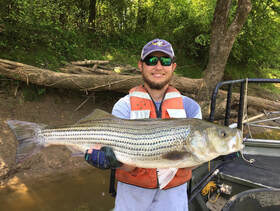
Chase Spicer
Chase is a PhD student in the IDPBBC Program at East Carolina University advised by Dr. Erin Field and co-advised by Dr. Gittman. Broadly, his research interests include restoration ecology, conservation of fisheries, natural resource management and policy, and studying the impacts of climate change on aquatic organisms and wetlands. His dissertation will focus on assessing how diadromous fish are influenced by river flows using eDNA and traditional techniques throughout stretches of the Roanoke River, evaluating the success of barrier removals in tributaries to monitor the overall aquatic species use of the expanded habitat, and contributing these results and knowledge to provide possible scenarios of how diadromous fish will respond to flows with climate change projections for Eastern North Carolina watersheds. Chase graduated from Western Carolina University in 2021 with a B.S. in Biology specializing in Ecology and Evolution and minored in Chemistry. He received his M.S. in Biology in August of 2023.
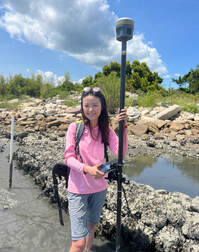
Georgette Tso
Georgette Tso is a PhD Student in the Integrated Coastal Sciences program at ECU. Her research focuses on green infrastructure design for coastal resilience using intertidal bivalve reefs. Prior to ECU, she studied concrete materials for "living seawall" design on the Boston Harbor Islands with Stone Living Labs, Boston Harbor Now, and the Nepf Lab. Georgette has a BS in Mechanical Engineering and an MEng in Environmental Engineering from MIT. She is co-advised by Dr. Siddharth Narayan in the Department of Coastal Studies at ECU.
Georgette Tso is a PhD Student in the Integrated Coastal Sciences program at ECU. Her research focuses on green infrastructure design for coastal resilience using intertidal bivalve reefs. Prior to ECU, she studied concrete materials for "living seawall" design on the Boston Harbor Islands with Stone Living Labs, Boston Harbor Now, and the Nepf Lab. Georgette has a BS in Mechanical Engineering and an MEng in Environmental Engineering from MIT. She is co-advised by Dr. Siddharth Narayan in the Department of Coastal Studies at ECU.
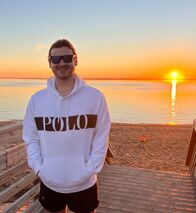
Dylan Whitt
Dylan Whitt is a M.S. student in the Department of Biology at East Carolina University. Dylan graduated from East Carolina University in 2022 with a B.S. in Biology.
Dylan Whitt is a M.S. student in the Department of Biology at East Carolina University. Dylan graduated from East Carolina University in 2022 with a B.S. in Biology.
Lab Alumni
Postdoctoral Researchers
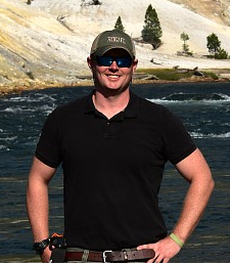
Dr. Chris Baillie
Broadly, Chris is interested in marine community ecology and conservation. More specifically, his research has focused on complex trophic interactions, connectivity of marine ecosystems and populations, and the impacts of anthropogenic modifications to coastal habitats and the ecosystems services they provide. Chris received his doctorate in Ecology, Evolution, and Marine Biology from Northeastern University in 2017. Since receiving his doctorate, Chris has worked as a post-doctoral researcher at Northeastern's Marine Science Center and UNC's Institute of Marine Science (UNC-IMS). Before graduate school, Chris worked for two years as a research technician at UNC-IMS after graduating from University of North Carolina at Chapel Hill with a B.S. in Biology in 2010.
Broadly, Chris is interested in marine community ecology and conservation. More specifically, his research has focused on complex trophic interactions, connectivity of marine ecosystems and populations, and the impacts of anthropogenic modifications to coastal habitats and the ecosystems services they provide. Chris received his doctorate in Ecology, Evolution, and Marine Biology from Northeastern University in 2017. Since receiving his doctorate, Chris has worked as a post-doctoral researcher at Northeastern's Marine Science Center and UNC's Institute of Marine Science (UNC-IMS). Before graduate school, Chris worked for two years as a research technician at UNC-IMS after graduating from University of North Carolina at Chapel Hill with a B.S. in Biology in 2010.
Graduate Students
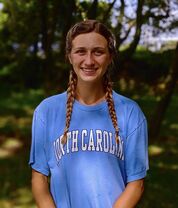
Anna Albright
Anna received her MS in Biology with the Gittman lab at East Carolina University in 2022. Broadly, she is interested in the intersection between natural and social sciences, examining anthropogenic impacts on marine environments as well as how to effectively communicate and engage the broader community in coastal restoration ecology. Anna graduated from the University of North Carolina, Chapel Hill with a Biology B.A. and Anthropology B.A. Previously she interned at the Sydney Institute of Marine Sciences on their Living Seawalls Project.
Anna received her MS in Biology with the Gittman lab at East Carolina University in 2022. Broadly, she is interested in the intersection between natural and social sciences, examining anthropogenic impacts on marine environments as well as how to effectively communicate and engage the broader community in coastal restoration ecology. Anna graduated from the University of North Carolina, Chapel Hill with a Biology B.A. and Anthropology B.A. Previously she interned at the Sydney Institute of Marine Sciences on their Living Seawalls Project.

Sarah Donaher
Sarah received her M.S. in Marine Sciences from UNC Chapel Hill in August 2020. Her thesis is entitled "Bivalve Facilitation Mediates Physical Disturbance on Temperate/Subtropical Seagrass Meadows". Her MS research is published in Ecosphere. She is now a Ph.D. student at Clemson University!
Sarah received her M.S. in Marine Sciences from UNC Chapel Hill in August 2020. Her thesis is entitled "Bivalve Facilitation Mediates Physical Disturbance on Temperate/Subtropical Seagrass Meadows". Her MS research is published in Ecosphere. She is now a Ph.D. student at Clemson University!
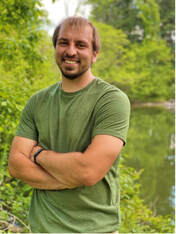
Adam Nothstein
Adam received his MS in the Department of Biology at East Carolina University with the Gittman Lab in 2022. He is broadly interested in coastal ecology and ecosystem preservation, with a more specific research focus on management of habitats that are necessary to maintain stable fish populations contending with high stress of human impacts. Adam graduated from Lock Haven University with a dual concentration B.S. in Biology and a chemistry minor, with additional field and course work being completed at the Chincoteague Bay Field Station in Wallops Island, Virginia.
Adam received his MS in the Department of Biology at East Carolina University with the Gittman Lab in 2022. He is broadly interested in coastal ecology and ecosystem preservation, with a more specific research focus on management of habitats that are necessary to maintain stable fish populations contending with high stress of human impacts. Adam graduated from Lock Haven University with a dual concentration B.S. in Biology and a chemistry minor, with additional field and course work being completed at the Chincoteague Bay Field Station in Wallops Island, Virginia.
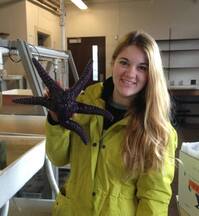
Stacy Trackenberg
Stacy is received her Ph.D. from the IDPBBC Program at East Carolina University in 2023. For her dissertation, she is studied how coastal ecosystems act as habitat for finfish and crustaceans with a focus on how these ecosystems act as nursery areas for many species. Much of her work focuses on seagrass faunal communities in North Carolina and which factors influence the habitat provisioning of these seagrass meadows. She is also studying how seagrass restoration across a depth gradient influences faunal community assembly and restoration success. Stacy graduated magna cum laude with Departmental Honors from the College of William and Mary in 2016 with a BS in Biology and a minor in Marine Science.
Stacy is received her Ph.D. from the IDPBBC Program at East Carolina University in 2023. For her dissertation, she is studied how coastal ecosystems act as habitat for finfish and crustaceans with a focus on how these ecosystems act as nursery areas for many species. Much of her work focuses on seagrass faunal communities in North Carolina and which factors influence the habitat provisioning of these seagrass meadows. She is also studying how seagrass restoration across a depth gradient influences faunal community assembly and restoration success. Stacy graduated magna cum laude with Departmental Honors from the College of William and Mary in 2016 with a BS in Biology and a minor in Marine Science.
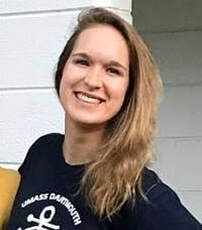
Emory Wellman
Emory received her M.S. in Biology with the Gittman Lab from East Carolina University in 2021. Her research interests include ecosystem services provision by coastal habitats, restoration ecology, and coastal policy and management. Before starting at ECU, Emory spent time working for non-profit Oceana, the Georgetown Climate Center, and in laboratories at the University of Massachusetts Dartmouth, the Dauphin Island Sea Lab, and UNC Chapel Hill's Institute of Marine Sciences. Emory graduated magna cum laude with Honors from Georgetown University in 2015 with a B.A. in Government. Her MS research is published in Ecological Applications. She is now pursuing a Ph.D. at the University of Florida!
Emory received her M.S. in Biology with the Gittman Lab from East Carolina University in 2021. Her research interests include ecosystem services provision by coastal habitats, restoration ecology, and coastal policy and management. Before starting at ECU, Emory spent time working for non-profit Oceana, the Georgetown Climate Center, and in laboratories at the University of Massachusetts Dartmouth, the Dauphin Island Sea Lab, and UNC Chapel Hill's Institute of Marine Sciences. Emory graduated magna cum laude with Honors from Georgetown University in 2015 with a B.A. in Government. Her MS research is published in Ecological Applications. She is now pursuing a Ph.D. at the University of Florida!

Nina Woodard
Nina received her M.S. in the Department of Biology with the Gittman and Blakeslee labs at East Carolina University in 2022. Her research interests include coastal restoration and management in order to preserve the ecosystem services these coastal habitats provide. Before starting her studies at ECU, Nina participated in marine science opportunities at the Rosario Beach Marine Lab in Washington, the Maryland Sea Grant, and the Duke University Marine Lab. Nina graduated from Andrews University in 2020 with a B.S. in Biology. Nina is now the Habitat Resilience Specialist at PLACE SLR.
Nina received her M.S. in the Department of Biology with the Gittman and Blakeslee labs at East Carolina University in 2022. Her research interests include coastal restoration and management in order to preserve the ecosystem services these coastal habitats provide. Before starting her studies at ECU, Nina participated in marine science opportunities at the Rosario Beach Marine Lab in Washington, the Maryland Sea Grant, and the Duke University Marine Lab. Nina graduated from Andrews University in 2020 with a B.S. in Biology. Nina is now the Habitat Resilience Specialist at PLACE SLR.

EOSA Alumni: Destinee Sinclair
Destinee is a Master’s student in the Department of Psychology at East Carolina University studying Industrial/Organizational Psychology. She is interested in studying how teams and leadership impact organizational effectiveness and productivity. Destinee graduated from Roanoke College with a Psychology B.A. in May 2021.
Destinee is a Master’s student in the Department of Psychology at East Carolina University studying Industrial/Organizational Psychology. She is interested in studying how teams and leadership impact organizational effectiveness and productivity. Destinee graduated from Roanoke College with a Psychology B.A. in May 2021.
